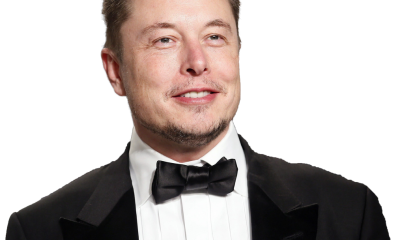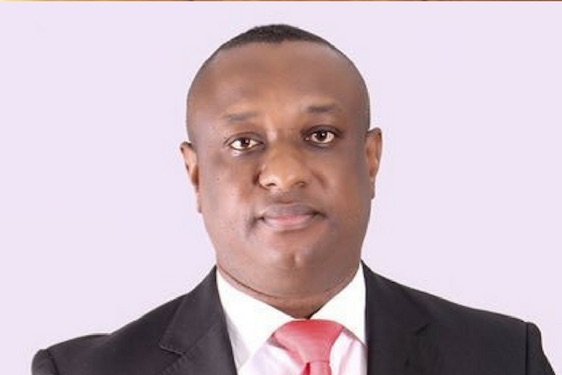BUSINESS
Elon Musk Acquires Twitter for $44bn

World’s richest man, Elon Musk has reached an agreement to acquire Twitter for approximately $44 billion, the company said.
According to the Associated Press (AP), Musk, the outspoken Tesla CEO, the world’s wealthiest person, had said he wanted to buy Twitter because he thinks it’s not living up to its potential as a platform for “free speech.
”He said Twitter needed to be transformed as a private company in order to build trust with users and do better at serving what he calls the “societal imperative” of free speech.
Twitter said it would become a privately held company after the sale is closed.
“Twitter has a purpose and relevance that impacts the entire world,” its CEO Parag Agrawal said in a tweet.
“Deeply proud of our teams and inspired by the work that has never been more important.”Musk describes himself as a “free-speech absolutist,” although he hasn’t been exactly clear what he means by that. In a recent TED interview, the billionaire said he’d like to see Twitter err on the side of allowing speech instead of moderating it. He said he’d be “very reluctant” to delete tweets and would generally be cautious about permanent bans. He also acknowledged that Twitter would have to abide by national laws governing speech in markets around the world.
The shares of Twitter, which has over 40 million Nigerians on its platform, were up 4.5 per cent in pre-market trading in New York at $51.15.
Musk, a prolific Twitter user, has said it needed to be taken private to grow and become a genuine platform for free speech.
The 50-year-old entrepreneur, who is also CEO of rocket developer SpaceX, has said he wanted to combat trolls on Twitter and proposed changes to the Twitter Blue premium subscription service, including slashing its price and banning advertising.
The billionaire, a vocal advocate of cryptocurrencies, has also suggested adding dogecoin as a payment option on Twitter.
He had said Twitter’s current leadership team was incapable of getting the company’s stock to his offer price on its own, but stopped short of saying it needs to be replaced.
“The company will neither thrive nor serve this societal imperative in its current form,” Musk said in his offer letter last week.
Up to the point Musk disclosed a stake in Twitter in April, the company’s shares had fallen about 10 per cent since Parag Agrawal took over as CEO from founder Jack Dorsey in late November.
The deal came just four days after Musk unveiled a financing package to back the acquisition. This led Twitter’s board to take his offer more seriously and many shareholders to ask the company not to let the opportunity for a deal slip away, Reuters reported on Sunday. Before Musk revealed the financing package, Twitter’s board was expected to reject the bid, sources had said.
The sale represented an admission by Twitter that Agrawal was not making enough traction in making the company more profitable, despite being on track to meet ambitious financial goals the company set for 2023. Twitter’s shares were trading higher than Musk’s offer price as recently as November.
Musk unveiled his intention to buy Twitter on April 14, and take it private via a financing package comprised of equity and debt.
Wall Street’s biggest lenders, except those advising Twitter, have all committed to provide debt financing.
Oil & Gas
NNPC Ltd. Records N5.8bn revenue, N748bn PAT in April

The Nigerian National Petroleum Company Limited (NNPC Ltd.) has announced a revenue of N5.89 billion and a Profit After Tax (PAT) of N748 billion for the month of April.
The NNPC Ltd. disclosed this in its Monthly Report Summary for April, released on Thursday.
The report highlights key statistics, including crude oil and condensate production, natural gas output, revenue, profit after tax and strategic initiatives during the period.
The report said that NNPC Ltd made statutory payments of N4.
22 billion between January and March.According to the report, crude oil and gas figures are provisional and reflect only NNPC Limited’s data.
It said that It excluded volumes of independent operators reported by the Nigerian Upstream Petroleum Regulatory Commission (NUPRC).
“Crude oil and condensate production averaged 1.606 million barrels per day (bpd) in April, while natural gas production was 7.354 million standard cubic feet daily.
“Petrol availability at the NNPC Ltd. retail stations recorded 54 per cent during the month under review, while upstream pipeline reliability was 97 per cent,” it said.
On its strategic efforts, it said that the company was collaborating with Venture Partners to accelerate Sustainable Production Enhancement.
It said that it completed the implementation of relevant presidential directives and Executive Orders for its upstream operations.
The report listed some Technical Interventions on Ajaokuta-Kaduna-Kano (AKK) pipeline and the Obiafu-Obrikom-Oben (OB3) gas pipelin to resolve challenges of River Niger crossings.
It said that the OB3 gas pipeline project was 95 per cent completed in the month, while the AKK pipeline was 70 per cent completed.
The report said that Turnaround Maintenance (TAM) was completed in several Oil Mining Leases (OML), including OML 18, OML 58, OML 118, and OML 133.
On Refineries Status, it said that the Port Harcourt Refinery Company (PHRC), as well as the Warri and Kaduna refineries were currently under review.
According to the report, all financial figures are provisional and unaudited, and all operational and financial data are for April unless indicated otherwise. (NAN)
Economy
Tinubu’s Democracy Speech Reflects Ambitious Vision – LCCI

The Lagos Chamber of Commerce and Industry (LCCI) says President Bola Tinubu’s Democracy Day speech reflects an ambitious and optimistic vision for Nigeria.
In a statement in Lagos on Thursday, the Director-General of LCCI, Dr Chinyere Almona, said the speech showed government’s appreciation of democracy, economic development, security and social cohesion.
Almona said that the President’s focus on economic growth, improving security, and increasing funding for education, healthcare, and infrastructure promised improved economic performance in the near future.
“We join all Nigerians to celebrate the peaceful transition and commitment to democratic values in the past 26 years.
“A stable political environment is very crucial for business success and for attracting investments.
“Government must stay committed to executing all its proposed programmes and ongoing reforms to ensure Nigerians reap the benefits of democracy without further delay,” she said.
The director-general also urged the government to ensure clear and consistent communication about economic reforms and policies to businesses and the general public.
This, she stated, would reduce uncertainty, build confidence and establish transparent mechanisms for tracking and reporting progress made through reforms.
Almona also called for targeted support for businesses to reduce their cost burdens relating to energy, logistics and regulatory compliance.
She said that LCCI recommended non-cash interventions that could ease the harsh production environment.
Almona also advocated expansion of social safety net programmes to support households affected by high living costs and inflation.
She also called for a more collaborative environment among government, businesses, the civil society and labour unions to ensure fair and timely negotiations on wages and working conditions.
She said that the government must implement programmes that would support strategic sectors pivotal to job creation, tax revenues and infrastructure development.
According to her, the oil and gas, power, and agriculture sectors require special attention as they offer catalytic support to the economy.
“As Nigeria reflects on the progress made and the path ahead, we urge government to remain steadfast about implementing all the required reforms toward a more sustainable and resilient economy.
“We call on government to work toward a nation built on the rule of law, justice and social cohesion even in our diversity and political sophistication,” she said. (NAN)
Economy
World Bank Cuts Global Growth Forecast to 2.3% for 2025

Global economic growth is projected to slow to 2.3 per cent in 2025 due to mounting trade tensions and persistent policy uncertainty, according to the World Bank’s latest Global Economic Prospects report.
A statement from the bank’s Online Media Briefing Centre on Tuesday noted that the new forecast was nearly half a percentage point lower than the rate projected at the beginning of the year.
The report indicated that the slowdown would mark the weakest non-recessionary global growth since 2008.
“The turmoil has resulted in growth forecasts being cut in nearly 70 per cent of all economies, across all regions and income groups,” the report states.
In spite of the gloomy outlook, a global recession is not anticipated. However, if current projections hold, average global growth in the first seven years of the 2020s would be the slowest of any decade since the 1960s.
Indermit Gill, the World Bank Group’s Chief Economist and Senior Vice-President for Development Economics, warned of deepening stagnation in the developing world.
“Outside of Asia, the developing world is becoming a development-free zone. It has been advertising itself for more than a decade,” he said.
Gill noted that growth in developing economies had declined steadily, from 6 per cent annually in the 2000s, to 5 per cent in the 2010s, and to under 4 per cent in the 2020s.
This trend mirrored the slowdown in global trade, which fell from an average of 5 per cent in the 2000s to under 3 per cent today. Investment growth had also weakened, while debt had surged to record levels.
The report projected that growth would slow in nearly 60 per cent of developing economies in 2025, averaging 3.8 per cent before a modest rise to 3.9 per cent in 2026 and 2027.
The report added that more than a full percentage point below the average of the 2010s.
“Growth in low-income countries is expected to reach 5.3 per cent in 2025, a 0.4 percentage point downgrade from earlier forecasts.
“Tariff hikes and tight labor markets are expected to keep global inflation elevated, with a projected average of 2.9 per cent in 2025, still above pre-pandemic levels.”
The World Bank warned that slowing growth would hinder efforts by developing economies to create jobs, reduce poverty, and close the income gap with advanced economies.
“Per capita income growth in these economies is forecast at 2.9 per cent in 2025, 1.1 percentage points below the 2000–2019 average.
“Assuming developing countries (excluding China) maintain a GDP growth rate of 4 per cent the forecast for 2027, it would take them about two decades to return to their pre-pandemic growth trajectory.”
Still, the report noted that global growth could rebound more quickly if major economies reduced trade tensions.
It said that resolving current disputes and halving tariffs could boost global growth by 0.2 percentage points over 2025 and 2026.
In response to rising protectionism, the World Bank urged developing economies to diversify trade, pursue strategic partnerships, and engage in regional agreements.
Given constrained public resources and growing development needs, policymakers are encouraged to mobilise domestic revenue, prioritise spending for the most vulnerable, and enhance fiscal management.
To drive sustainable growth, the report emphasised the need to improve business environments, expand productive employment, and align workforce skills with market demands.
Finally, it highlighted the importance of global cooperation in supporting the most vulnerable economies through multilateral initiatives, concessional financing, and targeted relief for countries affected by conflict.(NAN)























